THE DENTAL TEAM EXPERIENCE









 TRAVEL. VOLUNTEER. LEARN. GROW.
TRAVEL. VOLUNTEER. LEARN. GROW.

So you have decided to come to Guatemala to work hard and open your heart to something new? A few years ago I decided to do the same, as a way to learn more about Guatemala and give back to the country where my children were born. Little did I know that life would eventually lead me to serve thousands of Guatemalan children who struggle in poverty—children just like my own.
So, a warning. This could get under your skin and into your heart.
It started when I joined a Common Hope Vision Team. We built a house for a single mother of two, who had worked more than 200 hours to earn her new home. We dug ditches and sewed curtains. We packed school supplies with high school kids. And we were invited to visit with families in their homes. The images of those houses with their cornstalk walls and dirt floors stuck with me. It was then that I finally realized the everyday reality of poverty.
I came home and suddenly saw all of the abundance around me. I realized how much we have as Americans and gained a new appreciation for daily conveniences like dependable running water. At first I was overwhelmed with the privilege that comes with being born in a rich country. Now I understand it as a blessing because I can use my privilege to help families who are no different than yours or mine except they were born into a life of poverty. And the truth is, by giving back our lives become richer through new friendships, greater sense of purpose, a renewed sense of gratitude, to name just a few.
John Huebsch, who founded Common Hope with his family, started hosting teams because the experience of Guatemala helped him to understand himself and his place in the world. He wanted to share this experience with others who wanted to learn. If you are open, I believe you will leave Guatemala enriched by your experiences, too.
As you prepare for your trip, you will learn about Guatemala's violent past. Things are different now, and we don’t mean to scare you, but we also want you to know the truth. Clearly, traveling to Guatemala isn’t as safe as sitting in your living room, but life isn’t about staying as safe as possible. We have welcomed more than 3,000 people to Guatemala without one serious problem. We know how to do this, and we will be with you. Most people come a bit nervous of the unknown and leave eager to return. I hope you have a wonderful experience.
We look forward to seeing you in Guatemala,
Shari Blindt Executive Director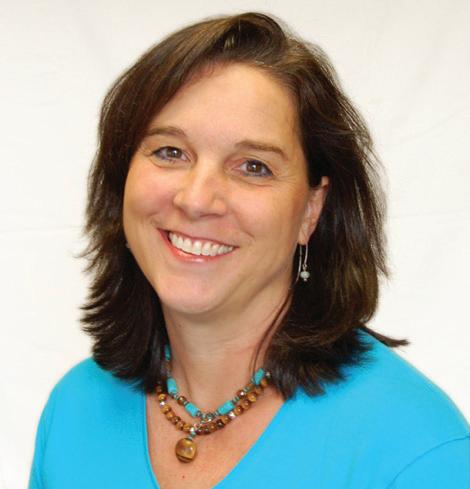

UNDERSTANDING
WHAT TO EXPECT IN GUATEMALA
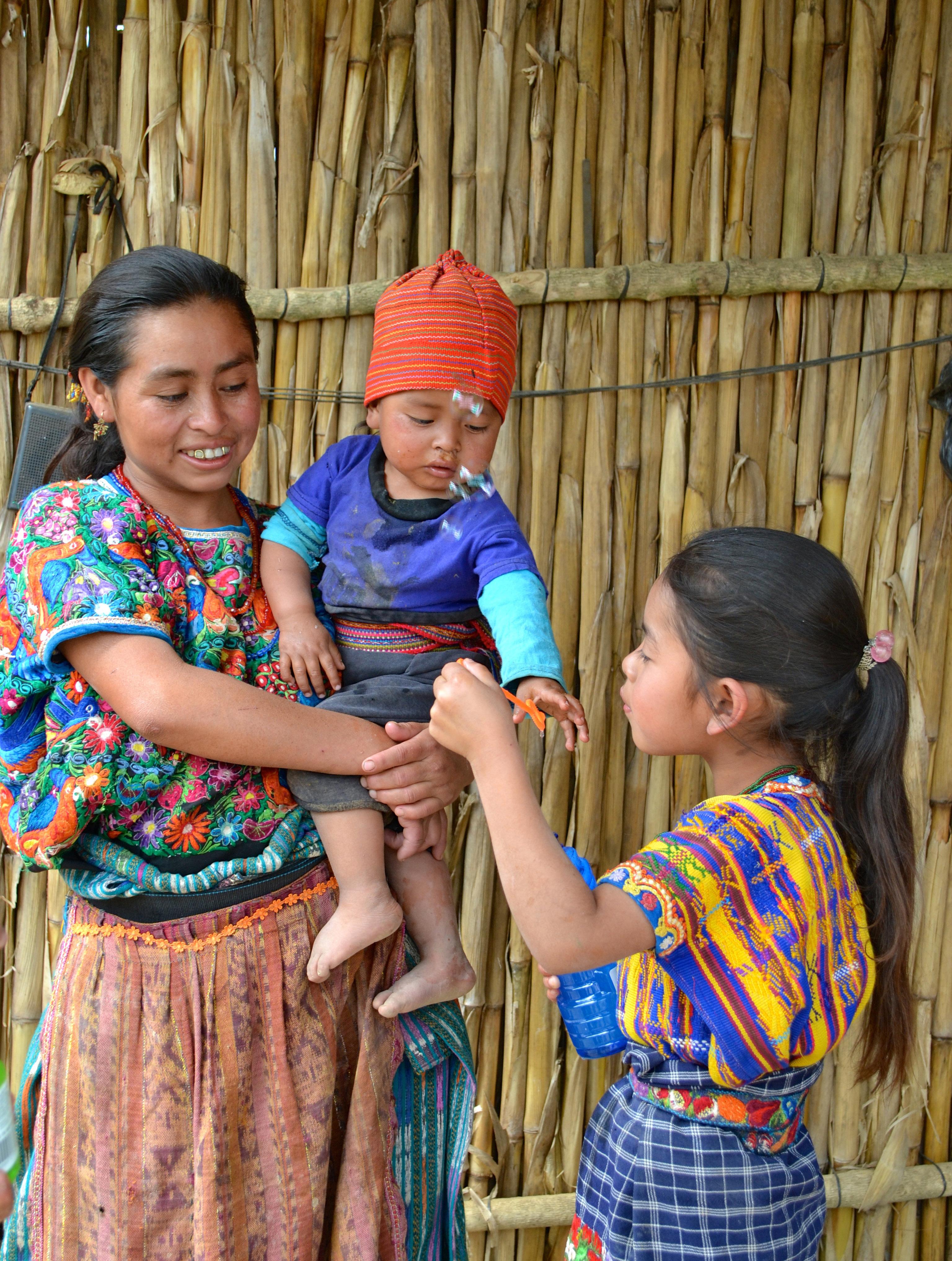
MISSION STATEMENT
Common Hope promotes hope and opportunity in Guatemala by partnering with children, families, and communities who want to participate in a process of development to improve their lives through education, health care, housing, and family development.
Common Hope's comprehensive, holistic model addresses insufficiencies in education, health care, housing and family development that prevent children from attending and staying in school.
As demonstrated for more than 35 years, these programs break the cycle of poverty in Guatemala through a partnership with families that preserves dignity, builds ownership in the process, and produces better results. The model creates the necessary supports for families to keep their children in school rather than going into the workforce as a child to supplement the family income. When a family is accepted into the program, Common Hope surrounds the family with opportunities that make school possible. Common Hope aids in the costs of attending school, provides access to health care, assists in finding and enhancing housing and delivers family development services, thus, eliminating the existing tension between a child’s education and the family’s most basic needs.
Common Hope also invests in improving the quality of education that our students receive by partnering with public elementary schools in communities where our families live. Through a partnership with teachers and school principals, schools are implementing classroom management systems to create healthier, more productive learning environments. Our program provides training and resources for teachers to foster reading and literacy, and improve mathematics instruction to build stronger foundations for children to continue their learning throughout their school years.
Common Hope has grown to serve more than 14,000 individuals in 27 communities in the Central Highlands of Guatemala through its family and school partnerships. More than 5,000 students benefit from our programs in education, and their families are building stronger, healthier lives.
Common Hope proudly acknowledges that it is not an organization making hand-outs, but rather, a partnership of helping hands making a difference in Latin America. Thank you for being one of those helping hands!
THE NEED Health care is the most urgent need of the poor—without it, survival is questionable and achieving goals through education impossible. Living in sub-standard conditions results in increased sickness and injury. Many Guatemalans die of preventable diseases and illnesses. It is common for people to live years with problems like dental pain or a hernia—conditions that can be easily treated. Infant mortality is among the highest in Central America. In Guatemala there are only nine doctors for every 10,000 people on average, and many patients cannot afford the cost of consults, treatments, and medications; therefore, the services we provide greatly reduced the risk of family health crises that threaten a child’s ability to stay in school.
A common issue that greatly impacts dental health among our population is adding sugar to baby’s bottles and giving children sweets to eat during the day. For this reason, it is quite common to see children with decayed teeth. Fortunately, dental hygiene has become more of a priority over the years in Guatemala—at least brushing twice or three times a day. Still, it isn’t common for families to seek out preventive dental care such as yearly cleanings or sealants. Many people suffer with severe pain in their mouths for weeks or months and do not seek dental care until they have an abscess. On average, Common Hope dental teams provide care to 1,000 patients each year—the vast majority of whom would not have access to care if not for Common Hope’s dental clinics.
THE PROGRAM Currently, the Common Hope Dental Program is maintained by small groups of volunteer dentists that attend our modest dental clinic in Antigua. These groups provide both preventive and curative care for hundreds of children and adults each year. Dental teams must bring all of their own equipment and supplies. See page 13 for a recommended list of supplies.
Ideally, Common Hope recruits a minimum of 4-6 teams every year to best serve our patients. Dental teams are groups of 10-12 volunteers who work in our clinics for the duration of a week. Each dentist typically sees 12-20 patients per day. Dentists are requested to bring an assistant—this can be a lay person who wants to volunteer with you or a professional.
In the Antigua Clinic, there are three BE AVERSTATE DENTAL units, three chairs (den-tal-ez), a compressor, and an x-ray machine. When we serve patients at the San Rafael clinic, there is one unit and two chairs. At both sites, Common Hope provides a staff member to assist with sterilization and interpreting.
Approximately 80% of the procedures are restorative/preventative and 20% are oral surgery. Generally, there is no capacity for Endo, Removable Pros, Fixed Pros, or Ortho; endo may be an option but dentists need to bring their personal materials and equipment.
Common Hope staff works to provide the best possible experience for volunteer groups. Each dental team will have a team coordinator in Guatemala who is responsible for making arrangements including meals, transportation and activities. The team coordinator is on hand in Guatemala to guide you through your week, answer any questions that may arise, serve as a translator throughout your trip, and provide general support during your stay at the project site.
SCHEDULE Throughout the week, the dental team works in the dental clinic in Antigua and occasionally visits San Rafael. In addition to your work in the clinic, your week can include a community visit with one of our social workers or other volunteer placements on site at Common Hope. The work day begins at 8:00am and concludes at 5:00pm.
Dental Teams are offered three itinerary options. They include:
• Orientation on staying safe and healthy; guidance on culturally appropriate behavior
• A tour of the Common Hope site which includes history and program details
• Important preventative and restorative dental volunteerism
• Accompaniment of a social worker on home visits in villages
• Volunteer opportunities in different program areas depending on our needs; could include pharmacy, maintenance, warehouse, library and/or daycare (depending on itinerary option)
• Visits to your sponsored child if you are a sponsor or choose to become one
• Cultural activities or tours during free time (depending on itinerary option)
ACCOMMODATIONS Teams are encouraged to stay at the project site in private dorm rooms. Room accommodations include:
• Rooms with bunk beds and bathrooms, a couple of rooms with double beds
• Bedding and towels
• Showers
• Large open-air living space with couches, refrigerator, microwave, and sink
• Use of washer and dryer
• Meals on site; breakfast foods provided for teams staying onsite and lunch and dinner served in our lunchroom
• Filtered water that is safe to drink
• Dietary needs (allergies, vegetarians, etc.) will be accommodated as best we can
• Phone calls to the U.S. if needed (donation recommended)
Dental Team Itinerary options can be found on the next page!
• 8-day/7-night experience, includes travel days (Sunday arrival - Sunday departure)
• 10-member minimum, 15-member maximum
• $1,000 fee per person. Fee includes lodging, meals, transportation to and from the airport, all activities, and translation services
• Airfare is NOT included in fee
• $500 fundraising minimum per person
• Must be 18 years of age or older OR accompanied by a designated chaperone
The Dental Hybrid Team is a combination of the Dental Work Team and a Vision Team. This experience is great if it is your first time traveling to Guatemala with Common Hope and if you plan to bring non-dental volunteers (family or friends) with you.
Dentist, hygenist and assistants will spend their volunteer placements at the clinic. Travelers without a dental background will engage in various activities at the project site and in the surrounding villages.
For both parties this experience includes:
• Your experience starts with orientation on what to expect in Guatemala, staying safe and healthy, and preparing for your trip
• Group transportation to and from the airport and to all activities during your trip dates (transportation before or after your trip dates is NOT provided)
• Stay at the Common Hope site in Antigua, including a full tour and brief history of our programs.
• A visit with your sponsored student if you are a sponsor or choose to become one
• Reflection time with your Vision Team Coordinator or on your own
• Contextual discussion with staff member in Guatemala
• Participation in a Day-in-the-Life experience in a family’s home
• Cultural activity or tour on the weekend to enjoy the beauty and people of Guatemala (See pages 14-15 for information on cultural activities)
• Dinner in Antigua to celebrate your week
• Access to your team’s Photo Diary; you can download and share all of the photos of your experience, which will be taken by your Vision Team coordinator in Guatemala
• Hands-on work in construction; most teams help build a home for a family in need
• Visit families in our programs with a Common Hope social worker in nearby villages
• Volunteer experiences in different programs areas such as education, pharmacy, youth support, warehouse, maintenance, library, or daycare. Your volunteer experiences will vary based on Common Hope’s needs at the time of your trip
• Includes accommodations or daily transport to/from hotel
• 10-12 dentists and assistants
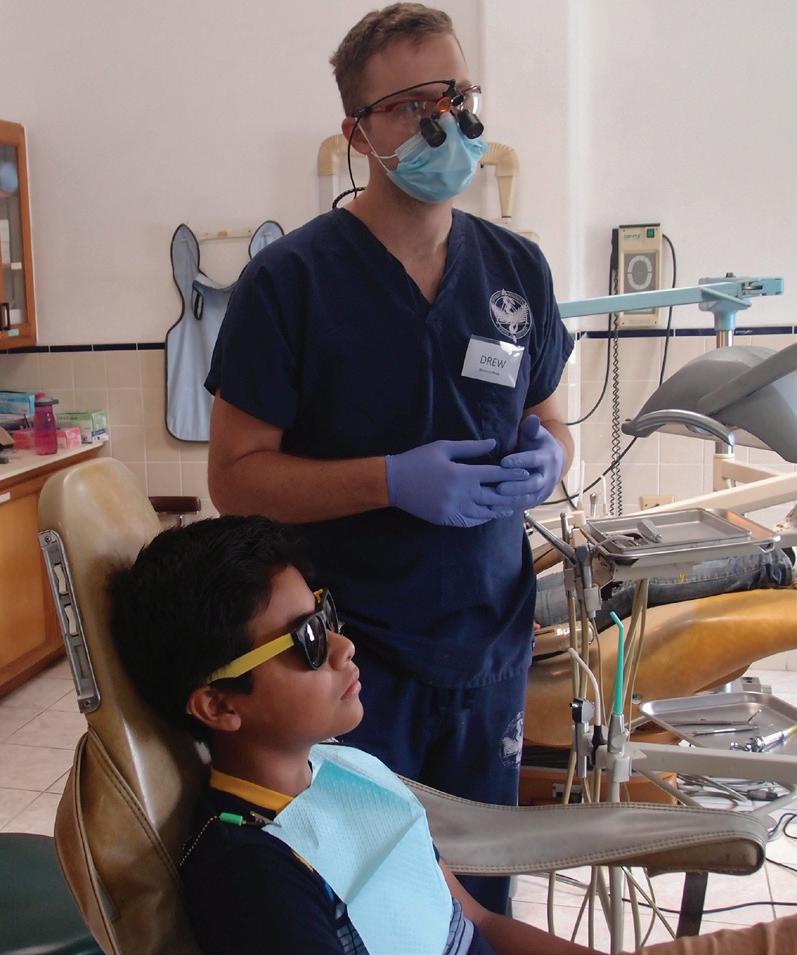
• 8 days/7 nights | Arrive Saturday | Sunday free day
- 2 Travel Days
- 3 Days Dental Work
- 2 Days Cultural Immersion
- 1 Free Day
• Cost: $650
• Fundraising: $200
This itinerary combines dental volunteerism with cultural immersion experiences.
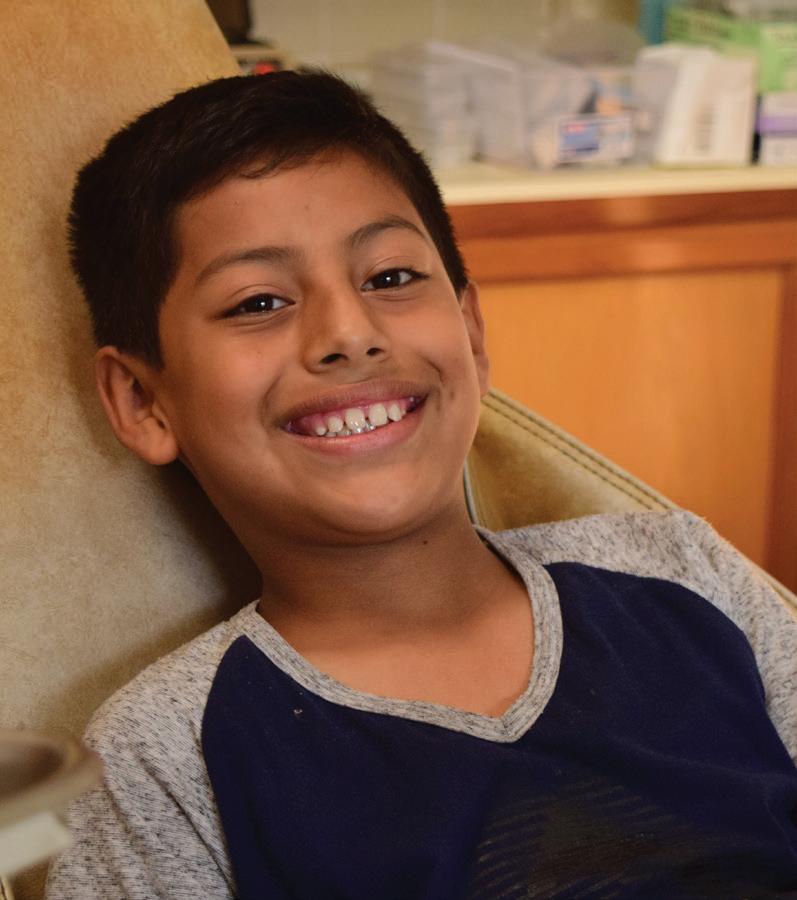
Includes:
• Accommodations/daily transport to/from hotel
• Transportation to project on arrival and departure dates
• Breakfast (if staying on site)
• Lunch each day
• One team dinner
• Orientation and Pueblo Tour
• Sponsorship visits if applicable
• All Translation Support
• A Day in the Life Activity for each team member
• Social work visits for each team member
• A cultural activity for each team member
Example Agenda:
• Arrive Saturday
• Sunday FREE
• Monday – Pueblo Tour AM, Work PM
• Tuesday – Work/Activity
• Wednesday – Work/Activity
• Thursday – Work/Activity
• Friday – Work AM, Free Time PM
• Depart Saturday
• Includes accommodations or daily transport to/from hotel
• 10-12 dentists and assistants
• 8 days/7 nights | Arrive Saturday | Sunday free day
- 2 Travel Days
- 4.5 Days Dental Work
- 1 Free Day
• Cost: $450
• Fundraising: $200
This itinerary focuses soley on providing dental services.
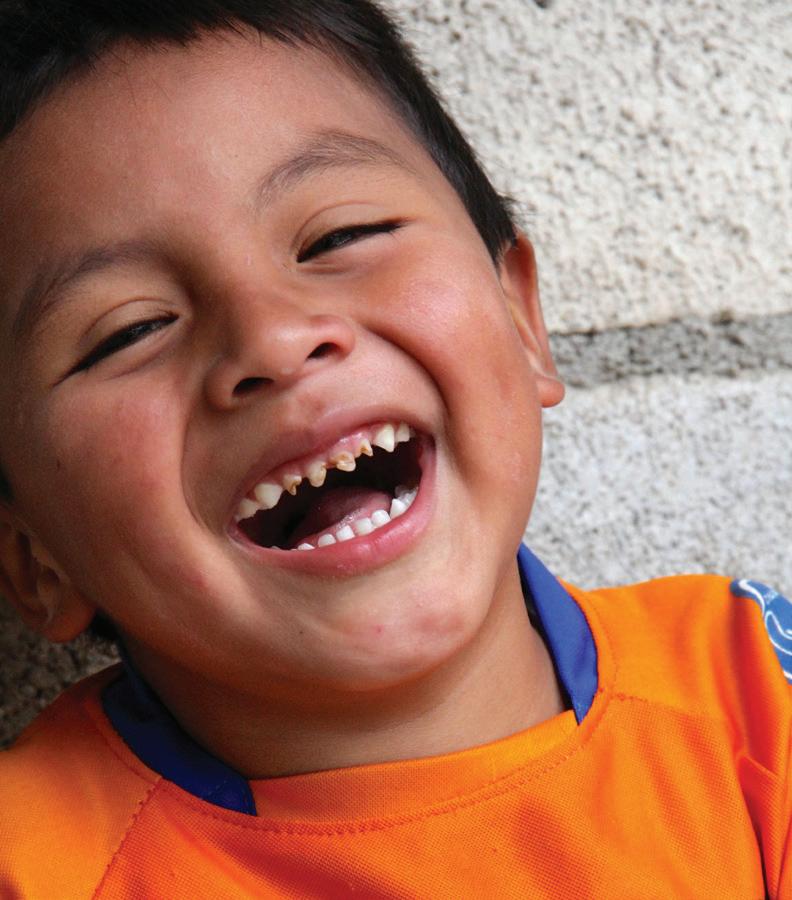
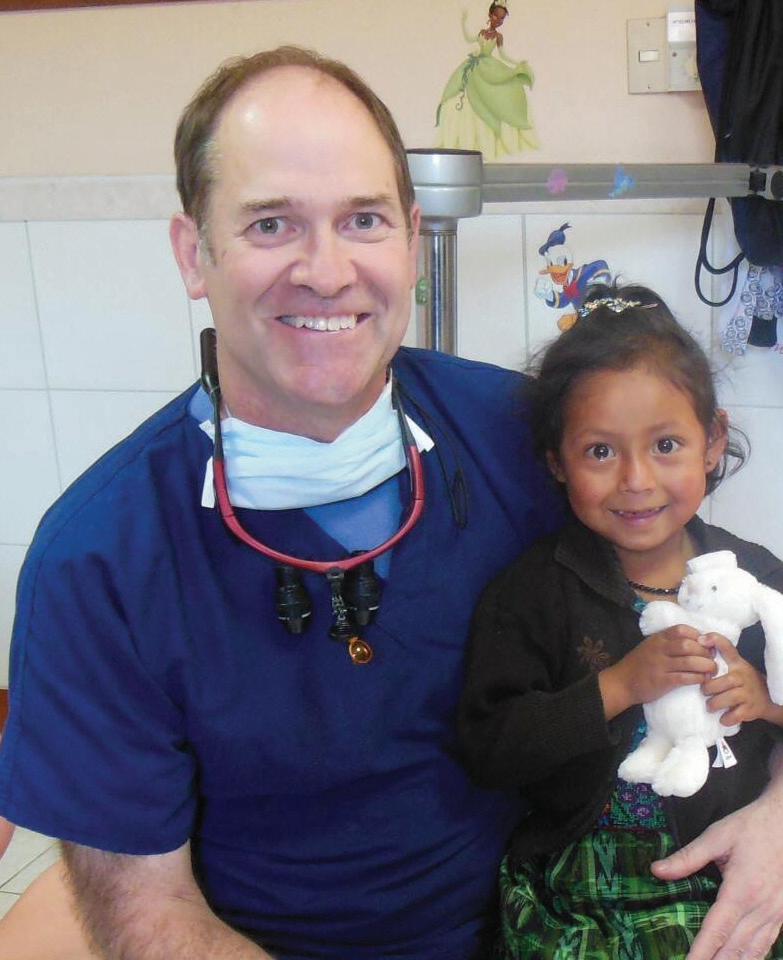
Includes:
• Accommodations/daily transport to/from hotel
• Transportation to project on arrival and departure dates
• Pueblo Tour and optional social work visit
• Breakfast (if staying on site)
• Lunch each day
• One team dinner
• Sponsorship visits if applicable
• All Translation Support
Example Agenda:
• Arrive Saturday
• Sunday FREE
• Monday – Pueblo Tour AM, Work PM
• Tuesday - Work
• Wednesday - Work
• Thursday - Work
• Friday – Work
• Depart Saturday
CANCELLATION POLICY In order to reserve your spot as a Dental Team member, you must submit your application with your deposit. This deposit is not refundable but is transferrable (date or person) up to six months prior to travel. Your final payment is due two months prior to your trip's departure.
The deposit can be applied to a future Dental Team trip if the cancellation is made within six months prior to travel.
• In case of natural disaster, medical emergency, civil or political unrest, or other refundable event, refunds will be issued to the party or person who made the payment.
• Natural disaster, family emergency, medical emergency and death in the family will be reviewed for possible refund on a case by case basis.
• In the case where a regional medical alert is issued by the CDC (example, Zika Virus) but travel is possible, deposits are not refundable.
• Common Hope does not make fee adjustments based on shorter travel periods or offsite accommodations.
• The fundraising balance is due one week prior to the trip. The credit card on file will be charged.
• In the event that unforeseen or additional costs exceeding $200 are incurred in order to provide a customized trip, Common Hope will notify team members in order to secure approval.
• Common Hope reserves the right to deny travel applications based on legal or regulatory considerations.
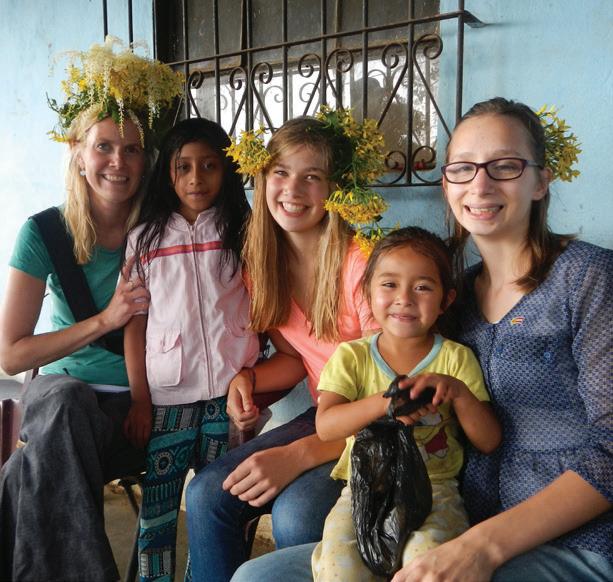
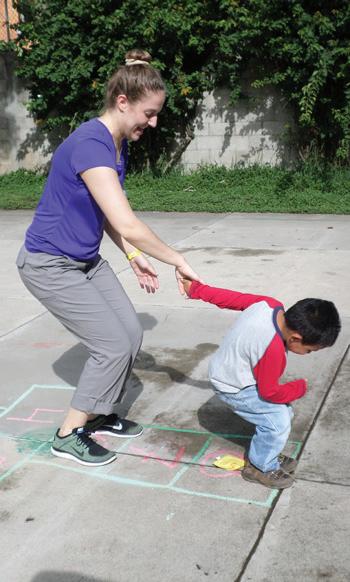

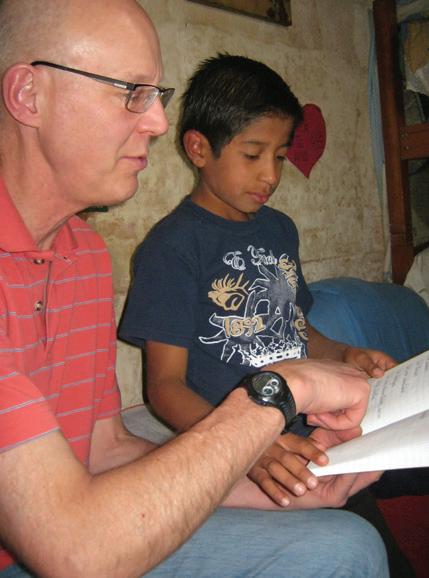
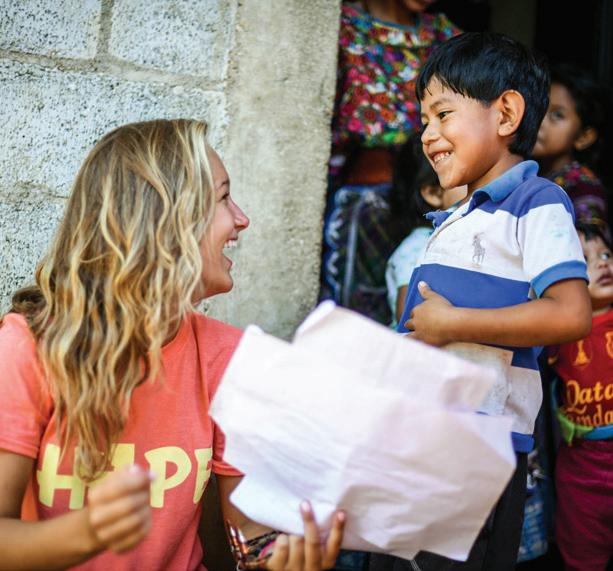
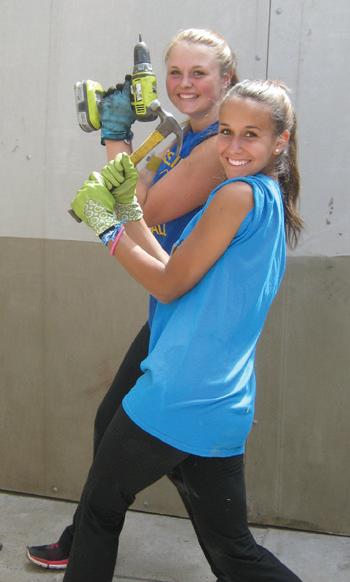
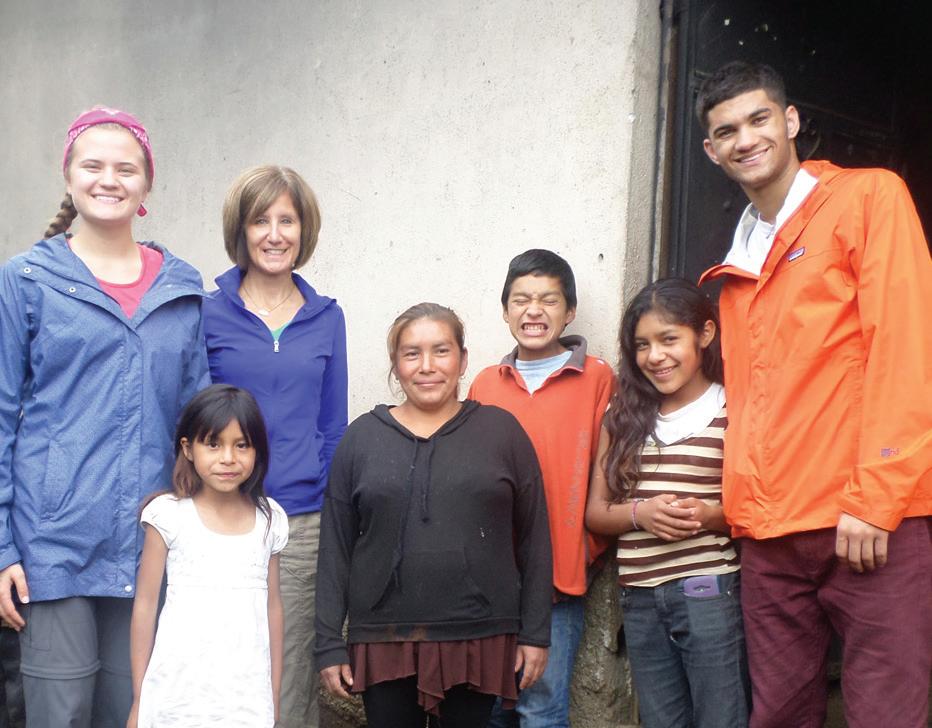
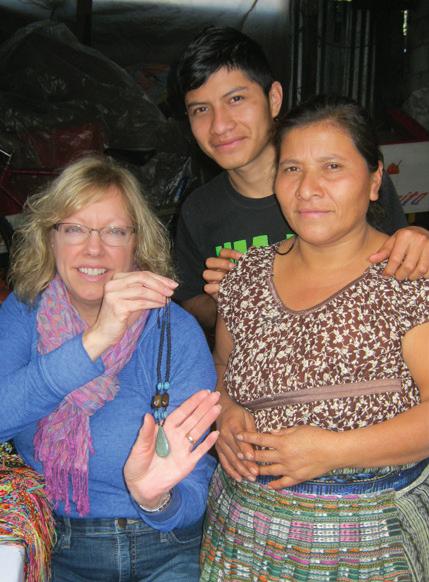
Passport A valid passport is required to travel to Guatemala. Please review your passport ahead of time to ensure it doesn't expire within 6 months of travel.
Dental Team Application & Liability Release Form These documents must be turned in prior to travel. The U.S. Vision Team Manager will provide them to you.
Dental License Please bring documentation of your dental creditentials
Attendance at Orientation Meetings You are required to attend orientation prior to your trip.
Review this Dental Team Resource Guide
PACKING FOR YOUR TRIP The most important thing to remember is to keep it simple! Pack clothing that can be layered. There is a laundry facility on-site for teams to use.
BRING PHOTO COPIES OF YOUR PASSPORT AND CREDIT/ATM CARDS Keep copies separate from your original documents in the case that they are lost or stolen.
LUGGAGE & SUPPLIES Dental Team members are required to bring all of their own equipment and supplies.
PLEASE SEE THE NEXT PAGE for a comprehensive list of dental supplies we reccomend that dental team members bring on their trip.
GENERAL PACKING LIST
□ Work pants
□ T-shirts
□ Comfortable work shoes
□ Casual outfits (shirt, pants, long skirts, capris)
□ Long sleeve shirt, sweatshirt, or jacket (for layering)
□ Rain jacket or poncho
□ Bandana
□ Water bottle
□ Hat for sun protection
□ Sunglasses
□ Sunscreen & lip balm with SPF
□ Ear plugs
□ Camera and charger
□ Small backpack
□ Travel alarm
□ Toiletries (soap, shampoo, toothpaste, etc.)
□ Journal and pen
□ Flip-flop sandals (for showering)
□ Insurance cards and other important documents
□ Prescription medications (packed in their original containers)
□ EPA Registered insect repellent
DO NOT BRING:
▣ Valuable jewelry
▣ Linens or towels (these are provided)
▣ Electrical adapters (current is the same)
▣ Candy or small gifts to hand out
▣ Shorts/short skirts (nothing above the knee is allowed)
BE PREPARED In general, you should plan to be self-sufficient. There may be some supplies available but Common Hope relies on the volunteer dentists to bring what they need to see/treat patients.
Dentists will generally see 12-20 patients a day/operator. We suggest dentists bring:
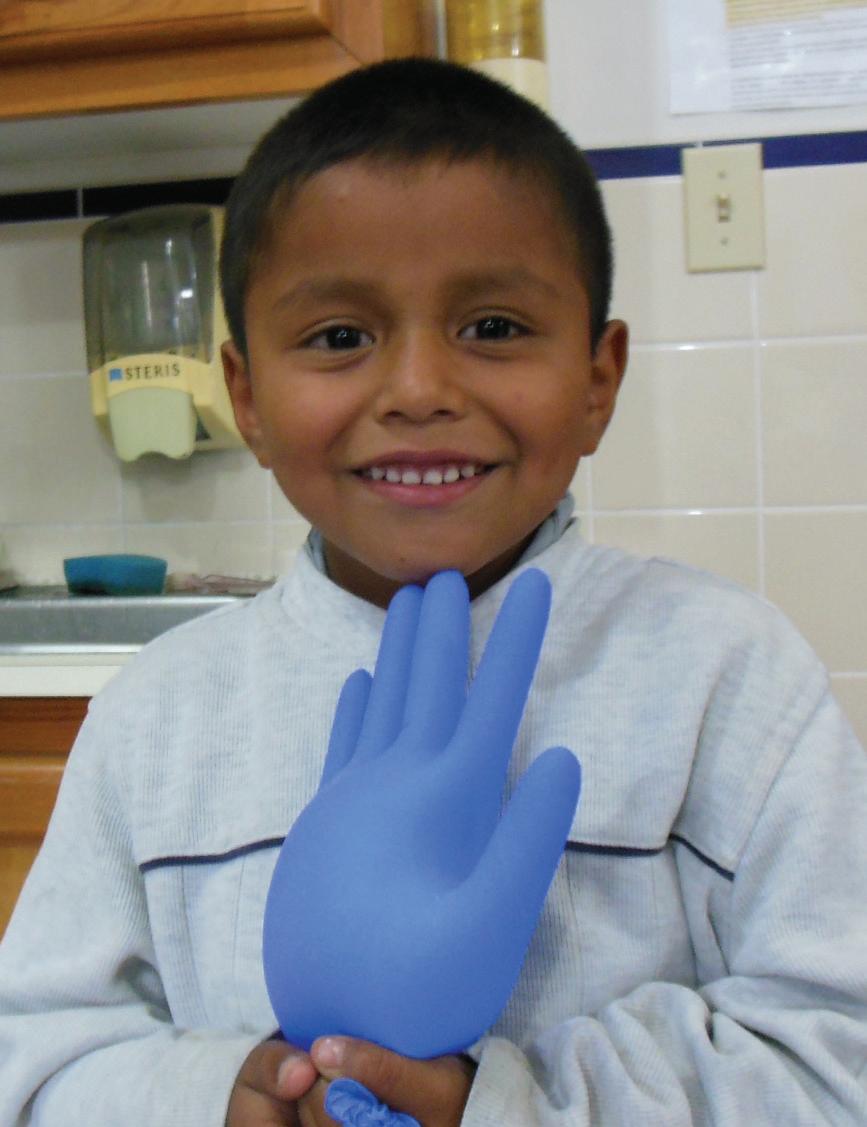
• Scrubs
• Handpieces: high and low for four hole attachment
• Surgical handpiece for Surgical Extractions
• Handpiece lubricant
• Instruments: Amalgam and composite
• Burs: your favorite operative and surgical burs, finishing burs for operative procedures
• Operative: Amalgam, glass Ionomer and conditioner, composite materials and enchant/bonding system
• Preventive: Prophy paste, Fl Varnish, tooth brushes/paste, floss
• Disposables: Patient napkins, saliva and high speed suction tips, air/water syringe tips, 2x2 gauze
• Endo: If you want to do Endo, you will need to bring everything you need to do a successful Endo including all canal lubricants and/or irrigation solutions you generally use
• Local Anesthetic: Your favorite - you may have to declare at Guatemalan customs.

*Common Hope will help with the paperwork and forms necessary for clearing customs if needed.
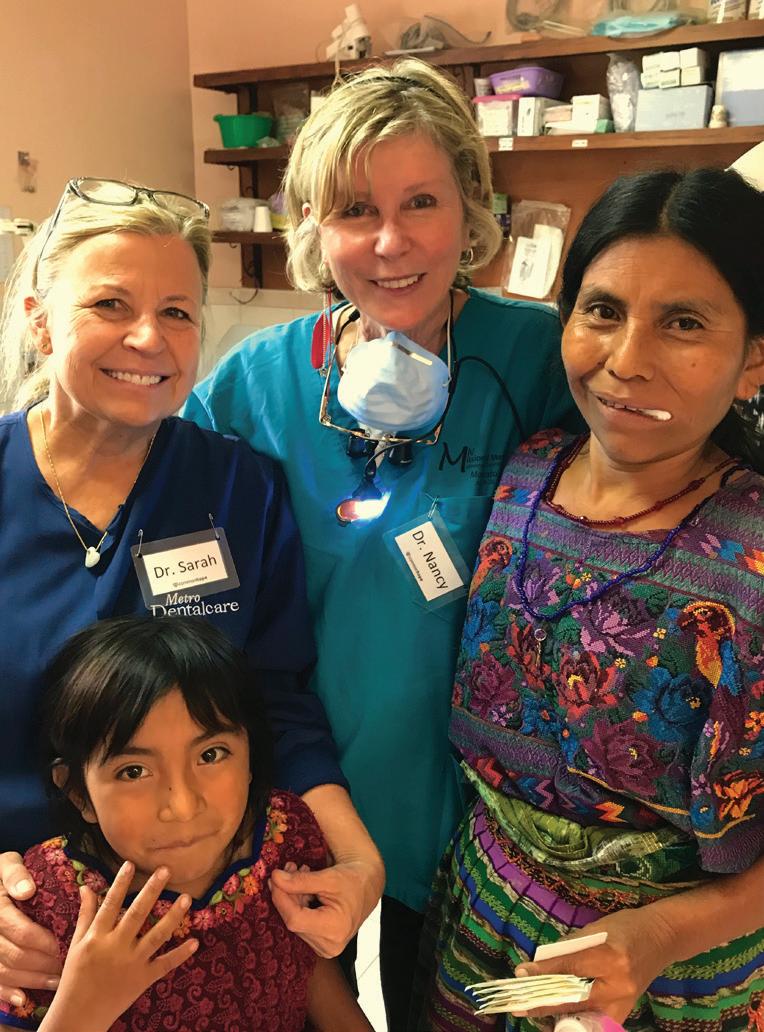


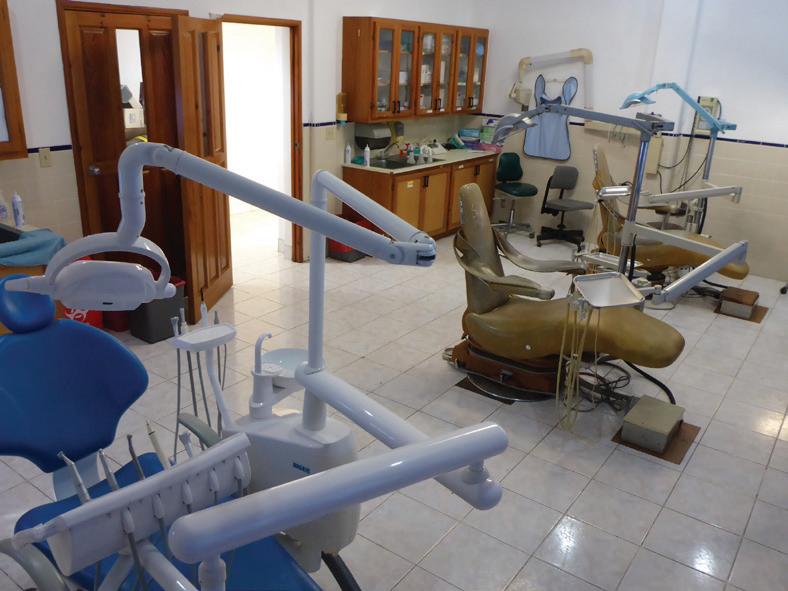


• Space dedicated on the second floor of the health clinic for dentistry
• Three operatory chairs with central air compressor and suction
• Portable Nomad X-Ray Unit with My Ray Digital Sensor
• High and low speed hand-pieces with four hole attachment: High - some push button, Low - latch type
• Amalgamator
• Curing Lights: Primarily Halogen
• Instruments: Mirrors and explorers, local anesthetic syringes, amalgam set ups, oral surgery forceps and elevators
• Composite instruments and oral surgery luxators exist but are limited in number
*Note: About 90% of procedures at this clinic are extractions, average one or two surgical extractions per day
• One room within the medical clinic of San Rafael Village is dedicated to dentistry
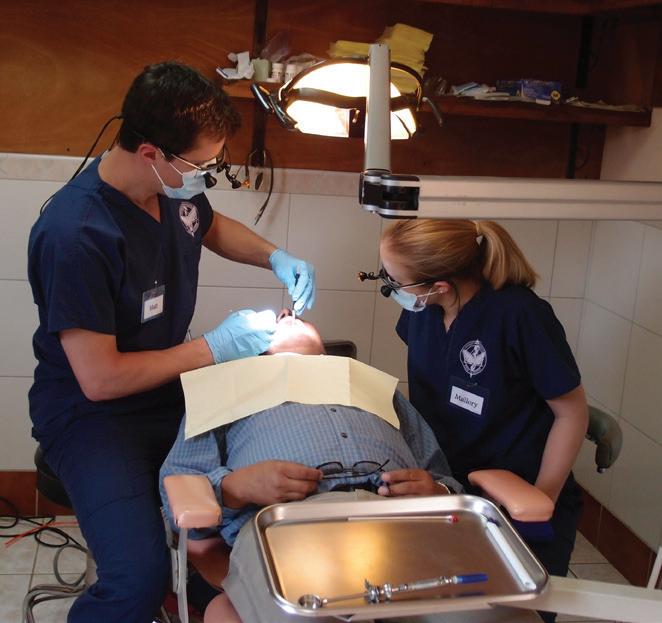
• One dental chair
In order to volunteer as an operative, oral surgery, endo or cleanings in our San Rafael location, dentists will need to bring:
• Amalgams, composite, and glass ionomer restoration, root canals, and extraction equipment
• Hand pieces (high speed, slow speed, surgical, and endo), burs, restorative materials, gauze, cold sterilization solution, my favorite extraction forceps and elevators, tooth brushes, etc.
• Staffing for sterilization
Thank you for providing dental services to Common Hope students and family members – and for giving them a reason to smile! Please consider supporting the Dental Program by donating any of the much-needed items listed below. All of us at Common Hope thank you for your generosity and support
Materials
1. Vitremer glass ionomer (spatulate or clicker)
2. Vitrmond glass ionomer
3. Ionomers in capsules A2, A3, A 3.5
4. Amalgam capsules of 1 and 2 doses
5. Fluid and condensation resin in composite or syringe A2, A 3, A 3.5, B 2
6. Recording Acid
7. Bonding
8. Diamond burs (Inverted cone, pencil tip, round, ball, chamfers of different sizes)
9. Dental bibs
10. Fluoride in varnish
11. Paste for prophylaxis
12. Brushes for prophylaxis
13. Alvogyl (Septodont)
14. Lidocaine
15. Articaine
16. IRM in capsules
17. Microbrush of different sizes
18. Catgut suture thread 3.0
19. Germicide for instruments
20. Nitrile gloves S and M
21. Birex (for surfaces)
Instruments
1. Photocuring Lamps
2. Amalgamator
3. Handpieces: high and low for four-hole attachment
4. Dental X-ray Sensor
5. Portable Rx device
6. Cavitron
Baby teeth: diente de leche
Bridge: el puente
Broken tooth: diente quebrado
Cavity: caries
Cheek: la mejilla
Composite: la resina
Enamel: el esmalte
Extraction: la extracción
Filling: relleno
Gause: gasa
Gum line: borde de las encías
Jaw: mandíbula
Lower teeth: dientes de abajo
Molar: muela
Palate: el paladar
Painkiller: El analgésico (Acetaminofén o ibuprofeno)
Pull a tooth: sacar un diente
Root: la raíz
Root canal: tratamiento de nervio
Wisdom tooth: la cordal
X-rays: rayos
Toothbrush : cepillo de dientes
Toothpaste : pasta de dientes
Dentist : dentista
Hygienist : higienista
Mouth : boca
Teeth : dientes
Dental Clinic : clínica dental
Dental Office: oficina dental
NEED MORE INFORMATION? Below you will find more online resources that can help you prepare for your trip. If at any time you have questions about traveling to Guatemala, you can contact the U.S. Vision Team Manager at 651-287-0712.
• Center for Disease Control website will provide you with the latest health recommendations pertaining to travel to Guatemala: www.cdc.gov/travel
• US State Department website has important information from the US Embassy regarding obtaining or renewing passport. You can also review the Consular information sheet on Guatemala: http://travel.state.gov/
EXCHANGING CURRENCY You can exchange currency before you travel or when you arrive. If you'd like to exchange before you go, contact your bank for current exchange rates and currency availability. Do this ahead of time as banks don't always keep Guatemalan currency (Quetzales) on hand.
If you prefer to exchange currency in Guatemala, your primary currency exchange should be made at the counter in the airport. Bring clean, new bills or withdraw money from an ATM upon arriving. Please also note:
• Traveler's checks or personal checks are not always accepted in Guatemala.
• Guatemalan banks will not exchange old, torn, or marked bills.
• A credit card (VISA is recommended) can be used in some stores and restaurants but not in the markets.
RECOMMENDED READING can be found below. We offer a list of books and articles on Guatemala's history and culture that you may find interesting and informative.
• Guatemala: Never Again! Human Rights Office of the Archdiocese of Guatemala (ODHAG) : This book is a detailed report of human rights abuses in Guatemala
• I, Rigoberta Menchu Rigoberta Menchu Tum : This book is a personal account by the Guatemalan indigenous leader who won the 1993 Nobel Peace Prize
• To the Mountain and Back: The Mysteries of Guatemalan Highland Family Life Joann E. Glittenburg : This book is a personal account of the author's experiences in the highlands of Guatemala and her own growth as a nurse, anthropologist, and person becoming aware of the world community.
• Bridge of Courage, Life Stories of the Guatemalan Companeros and Companeras Jennifer Harbury : This book shares stories of how and why people made the decision to work the revolution in Guatemala.
• Bitter Fruit: The Story of the American Coup in Guatemala Steven Schlesinger and Stephen Kinzer : This book is a comprehensive account of the CIA operation which overthrew the democratically elected government Jacobo Arbenz in 1954.
• Weaving Common Hope Zach Thomas : This book explains how Common Hope began and developed its multi-faceted approach to addressing poverty.
GEOGRAPHY OF GUATEMALA The country of Guatemala is approximately the size of the state of Tennessee and is home to more than 14 million people.
COMMON HOPE SITES
• Antigua is approximately one hour from Guatemala City and it is home to Common Hope's Family Development Center, which serves as the main base of operations for our work in Guatemala. Many of the communities Common Hope works in are located in the Antigua Valley. Antigua is known for its Spanish Colonial architecture and is a very popular tourist destination.
• New Hope Village was built by Common Hope in 1999 after Hurricane Mitch devestated the area. It is home to approximately 50 families. Common Hope also operates a school in the community.
• San Miguel Milpas Altas is a village 20 minutes east of Antigua. It is home to approximately 1,600 people, most of whom work as day laborers in gardening, farming, and carpentry.
• San Rafael is an indigenous community located 40 minutes northeast of Antigua. The residents are Mayan and speak Kaqchikel, one of over 20 Mayan languages.
PRESCRIPTION MEDICATIONS Pack enough medication to last the entire trip and bring copies of your prescriptions in case you run out or need a refill while in Guatemala. Be sure to keep your prescription medications in their original containers and only travel with medications that you own (or your child's). If you wear contact lenses, pack a back-up pair, as well as a pair of glasses and a copy of your lens prescription.
If you are prescribed a controlled substance or use an injectable medication, please ask your physician for a doctor's note to describe your medical condition in writing in the event that clarification and/or confirmation of your condition is needed.
IMMUNIZATIONS No immunizations are required for travel to Guatemala. However, Common Hope follows CDC recommendations*, which currently include:
• A tetanus booster because Vision Teams typically perform construction work.
• Hepatitis-A vaccination, a two-shot series, the first of which should be given 4-6 weeks before departure for maximum immunization. The second shot is given 6 months after the first.
• Hepatitis-B vaccinations, a three-shot series. The second dose must be given at least one month after the first dose. The third dose must be given at least two months after the second dose and at least four months after the first.
• Typhoid vaccination, which could be pills or a shot. Talk to your doctor about what is best for you.
Cholera and typhoid do exist in Guatemala but do not pose a problem when food is carefully selected and properly prepared. PLEASE, DO NOT EAT STREET FOOD. Malaria does not pose a health risk in Antigua and New Hope Village due to high altitudes, however, team members should wear bug spray to prevent infection of dengue, chikungunya or zika.
Please note that Guatemala and the Common Hope project site are not ADA compliant. There are many stairs to access sleeping quarters and the streets in Guatemala are cobblestone, very uneven, and can be dangerous for those walking with a cane. Bring masks if you have asthma. Volcanoes in the area occasionally cause ash to be present in the air.
Pack your prescriptions in their original container if you can. If you take a controlled substance or an injectable medication, bring a doctor's note.
Immunizations are recommended but not required for travel to Guatemala.
Bring a mask if you have asthma. Volcanoes occasionally spew ash into the air.
IN CASE OF EMERGENCY In the event of an emergency, friends or family can reach you by calling the Common Hope office in St. Paul, Minnesota during normal business hours or leave a message if the office is closed. They can also contact you at the project site in Antigua (Familias de Esperanza) in Guatemala in the case of emergency.
*Be aware that in Guatemala the phone is answered in Spanish. A person who speaks only English should speak slowly and clearly and an English speaker will be put on the phone.
COMMON HOPE U.S. OFFICE FAMILIAS DE ESPERANZA, ANTIGUA
1410 Energy Park Drive Km 2, Carretera a San Juan del Obispo Suite 4 Antigua, 03901 Sacatepéquez
St. Paul, MN 55108 Guatemala, Centro América
Phone: 651-917-0917
Fax: 651-917-7458
Email: info@commonhope.org
OTHER CONTACT INFORMATION
Before Travel (While still in the U.S.)
*Phone: 011-502-7-922-6600
(Phone will be answered in Spanish.
Please speak slowly and clearly ask to be transfered to an English speaker.)
Jennifer Arcos Rodriguez, U.S. Visitor Experience Manager
Direct line: 651-287-0712 (Monday - Friday, 8:30am - 5:00pm)
Cell phone: 612-719-6518 (For travel-related emergencies only, please.)
Email: jennifera@us.commonhope.org
During Travel (While in Guatemala)
Jaime de Leon, Associate Director of Visitor Experience Volunteers, and Sponsorship
Cell phone: 502-4264-9205 (Monday - Friday, 9am - 5:30pm)
Email: jaimed@guate.commonhope.org
Hospitality Cell Phone: 502-5482-7419 (assigned to your team coordinator)
Direct line: 651-287-0740 (Monday - Friday, 8am - 5pm)
Voyageur Tours (Shuttle Service to and from airport)
Office phone: 502-7832-4237
Cell Phone: 502-3009-4864
Email: info@cometoguatemala.com
Guatemala Hospitality Office (U.S. extensions only, Monday - Friday, 8am - 5pm)
651-287-0722
*To dial Guatemala from the U.S. rst dial 011-502
To dial the U.S. from Guatemala rst press 001 followed by the area code (001-area code)
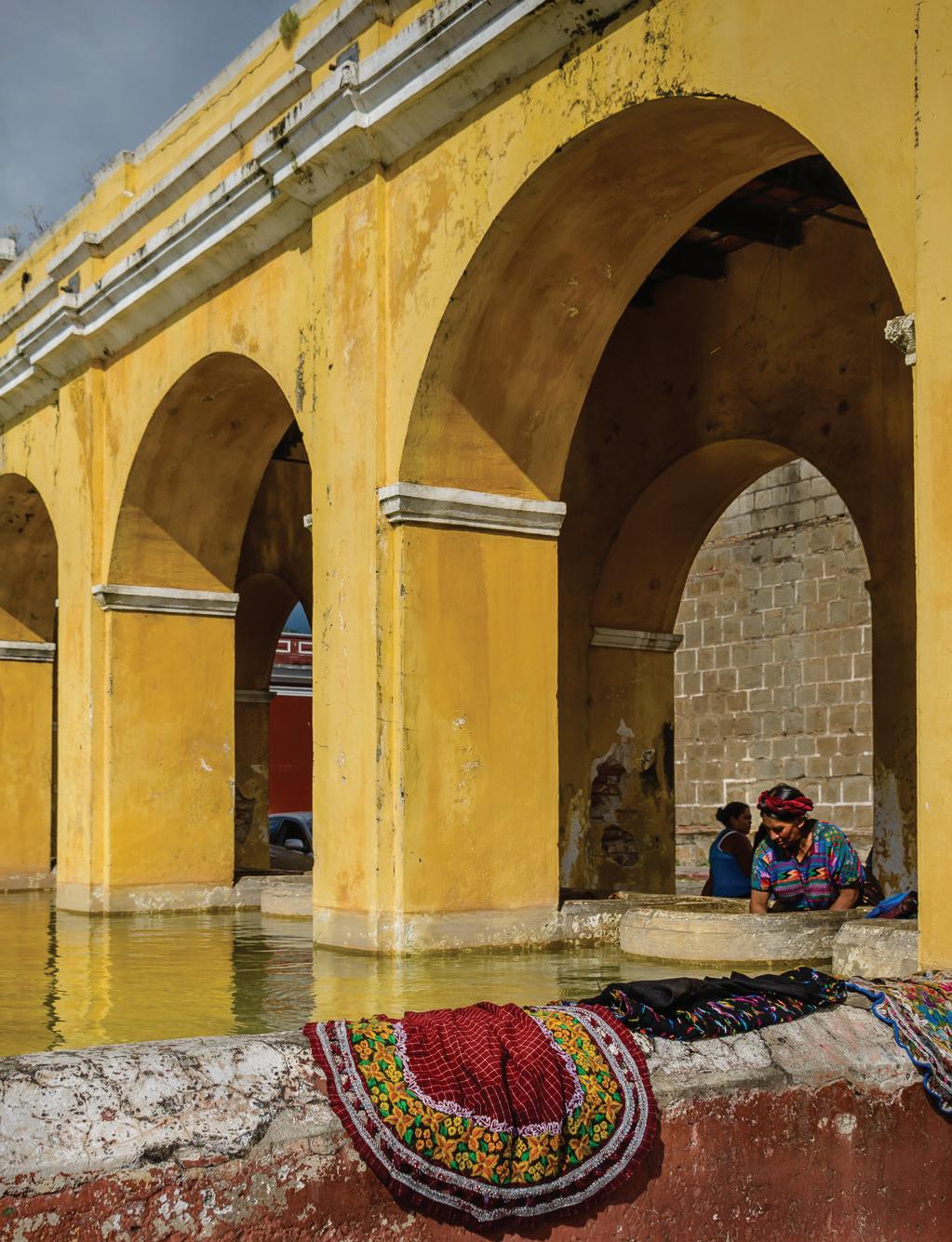
LIFE IN GUATEMALA Guatemala is a geographically diverse country with tropical rain forests, mountains, volcanoes, lowland forests, and beaches. Guatemala's main exports include coffee, bananas, sugar, vegetables, and textiles.
For many, it is difficult to find work that pays enough to support a family. In Guatemala, 26% of the population lives on less than $2 per day and 54% live below the country's poverty line. The World Bank and UNDP characterize Guatemala among the most unequal countries in Latin America and the world.
EDUCATION IN GUATEMALA Many families cannot afford to send their children to school, and the literacy rate, at 69% is among the lowest in Latin America. Only 32% of children complete junior high and only 18.6% receive a high school diploma.
HEALTH CARE IN GUATEMALA Health care is limited to 9.7 doctors for every 10,000 people, and many people suffer from easily preventable or treatable diseases like asthma, diabetes, and diarrhea. Malnutrition is common, with 13% of children being underweight.
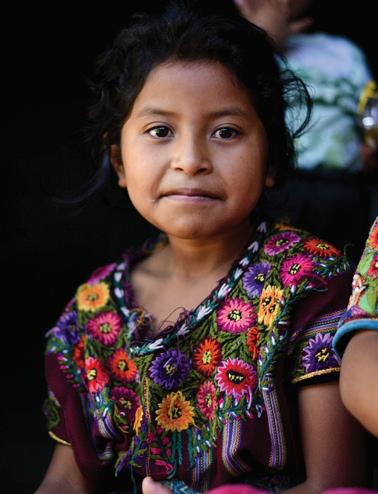
FLEXIBILITY AND OPEN-MINDEDNESS
The most important thing for any Dental Team member to have is a flexible attitude, an open mind, and an open heart. The pace of life in Guatemala is more relaxed than what you are most likely used to. More often than not, schedules and people can run late. In Guatemala this is not considered rude. Please do not become frustrated. Rather, enjoy the beautiful scenery, soak in the culture, play with the children, and make the most of the opportunity!
WHEN YOU ARRIVE IN GUATEMALA Your Team Coordinator in Guatemala will provide you with an orientation that will help you navigate greeting and interacting with Guatemalans, how Western culture is perceived, maintaining a positive image, etc.
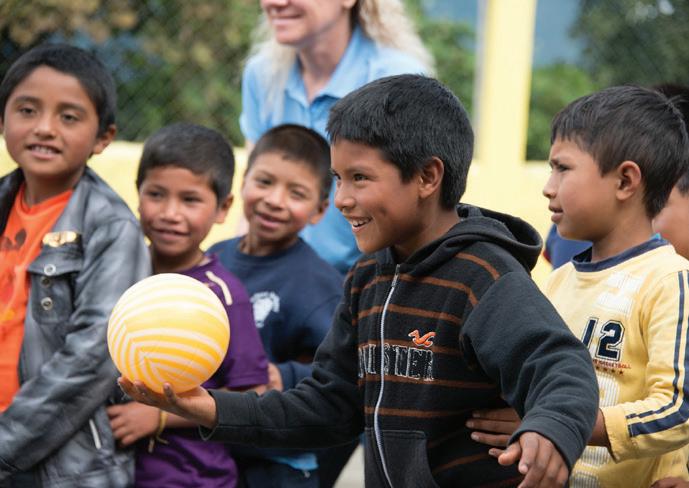
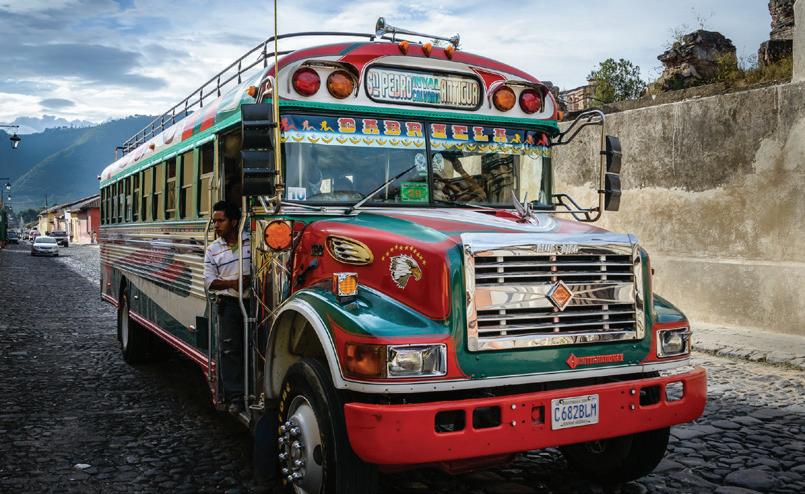
Like every place in the world, Guatemala deals with crime and violence on a daily basis. Guatemala is the largest and most populous country in Central America, and it has seen crime increase in recent years. These trends complicate our work, yet make it more necessary. To be clear, Common Hope does not believe that it is unsafe to visit Guatemala. However, we acknowledge that street crime and gang activity are a reality. We do everything possible to avoid known dangers and reduce exposure to risk.
Common Hope has more than 35 years of experience keeping visitors and staff as safe as possible. We cannot guarantee your safety, but we will do everything in our power to minimize your exposure. The Dental Team's safety comes before the Dental Team's experience, so we ask you to be understanding if an activity must be canceled due to security reasons. We expect visitors to follow our safety advice and understand that our policies are in your best interest.
You will receive an extensive safety orientation upon arrival in Guatemala, but here are some general safety guidelines and recommendations to familiarize yourself with before your trip.
• Our Antigua site where teams stay has walls, barbed wire fencing, locked gates, security cameras, radios, and cell phones. Access to the grounds is monitored by security guards at all times.
• Regular rounds are made at each project site throughout the day and night.
• Our staff is in regular contact with international and national officials in Guatemala including the UN, US Embassy, and local officials regarding security.
• Staff and long-term volunteers stay up-to-date on local situations and potential unrest, and they make informed decisions based on that information.
• Guards and members of the staff are trained in how to deal with emergency situations, and more importantly, in how to avoid potential problems.
• Always remember you are in a foreign country. Do not be careless in public places.
• Be aware of your surroundings at all times. Be particularly conscious of your personal belongings such as money, cameras, backpacks, iPhones, etc.
• Carry only what you need! Do not carry items with you that you are not willing to lose should something happen.
• Do not go out alone or leave the project site without letting a staff member know where you are going even if you've traveled to Guatemala before.
• If you find yourself in a dangerous situation, stay as calm as possible and do not resist.
• Only utilize taxis with which Common Hope has an established relationship. Staff in Guatemala will give you a list of these.
• Respect Common Hope's recommendations and do not leave the project site in the evening. Do not walk alone outside of the project site. Do not wander off by yourself during visits to surrounding communities.
Common Hope is excited to welcome all visitors, volunteers and guests to serve and learn more about our mission to help children and families in Guatemala. The following policies are applicable to all visitors and volunteers in Guatemala including Vision Teams, Teambuilders, Dental Teams, and Short-term Volunteers. Common Hope reserves the right to dismiss any volunteer or visitor who acts irresponsibly and does not respect these policies and/ or does not use best practices for keeping safe and secure while visiting.
Leaving the Project
• If staying at the Project, inform the guard every time you leave the Project and give an estimated time of return. This is in case anyone is looking for you internally and/or you do not come back in a reasonable time.
• Respect Common Hope's recommendations and do not leave the project in the evening unless arranged through Common Hope ahead of time.
• We do not allow visitors to walk alone along the road between Antigua and the Project; we do allow visitors to walk in groups on the road between 7:30-8:00am and 5:00-5:30pm during the work week.
• It is strongly recommended that visitors do not walk between the Project and Antigua on weekends or holidays. Common Hope recommends using a taxi, which the guards can assist in contacting.
• When leaving the Project, stay inside the gate until transportation arrives, do not stand with the door or gate open.
• Only the guards are allowed to open the gate.
• Guards use the peep door before opening the gate.
• Do not wait outside the gate for rides.
Returning to the Project
• Curfew at the project is 11:00PM—visitors must be inside the Project by that time. If visitors break curfew, the next day they may be asked to leave. Curfew is in place for visitor safety.
• When arriving, have the driver wait until you are safely in the gate.
Any activity that is planned and endorsed by Common Hope includes accompaniment by a local representative.
In the event of an emergency:
In the event of an emergency and/or incident contact a key staff member (Associate Director of Visitor Experience, Volunteers, and Sponsorship, the Team Coordinator, or the Country Director) immediately; please carry their phone numbers with you at all times. If an emergency occurs at night, call your Team Leader or the Associate Director of Visitor Experience, Volunteers, and Sponsorship immediately.
1. Evacuation
• Common Hope follows the U.S. State Department’s Smart Traveler Enrollment Program to determine the need for any political evacuation.
• Common Hope would inform volunteers and comply with orders.
• Common Hope has never had to evacuate volunteers.
WHAT YOU CAN DO TO STAY HEALTHY Part of being a good Dental Team member is deliberately doing what it takes to stay healthy during your trip. That being said, some team members get colds or mild stomach flu when they travel. Here are a few tips we recommend to teams that will help you stay healthy.
• Wash your hands frequently and dry them completely.
• Shield yourself from the sun. Wear hats and sunscreen.
• Stay hydrated! Drink lots of water. Water at the project site is purified and safe to drink.
• Only use ice that you know has been made from purified water.
• Keep your feet protected by wearing shoes.
• Eat only cooked vegetables and always peel fresh fruit before eating.
• Do not eat fruits that have been peeled for you, like mango sold on the street.
• Do not eat street food! It may look tempting, but there is no way to ensure that it has been properly cooked.
• Avoid eating all fish and raw shellfish.
• Know your limits and do not push yourself beyond them! If you are uncomfortable with any activities you are asked to do, please don't hesitate to notify your Team Coordinator. Common Hope understands that some of these activities can be strenuous for some and we are happy to find activities that are within your limits.
IN THE CASE OF INJURY OR MEDICAL EMERGENCY Team members will have access to Common Hope's on-site clinic and our medical staff with assist you in the event of a medical problem or injury. You will also have access to a first-aid kit.
EMERGENCY CONTACT INFORMATION CAN BE FOUND ON PAGE 21!
US » Common Hope
1410 Energy Park Drive Suite 4 St. Paul, MN 55108 phone 651.917.0917
GUATE » Familias de Esperanza
Km. 2 Carretera a San Juan del Obispo
Antigua, 03901 Sacatepéquez
Guatemala, Centro América
www.commonhope.org
Common Hope’s mission is to promote hope and opportunity in Guatemala, partnering with children, families, and communities who want to participate in a process of development to improve their lives through education, health care, and housing.
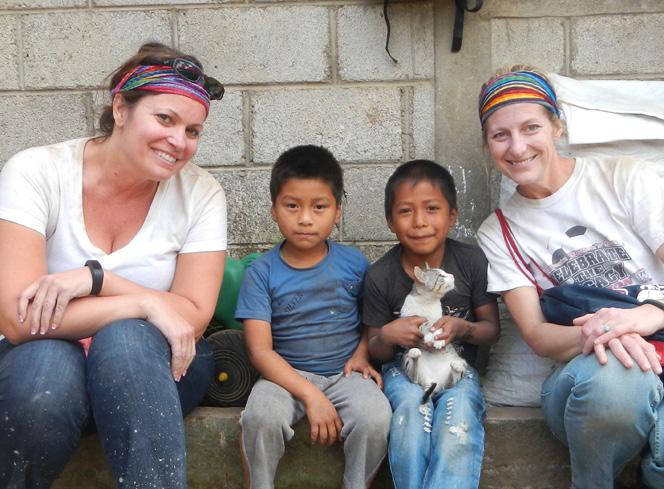
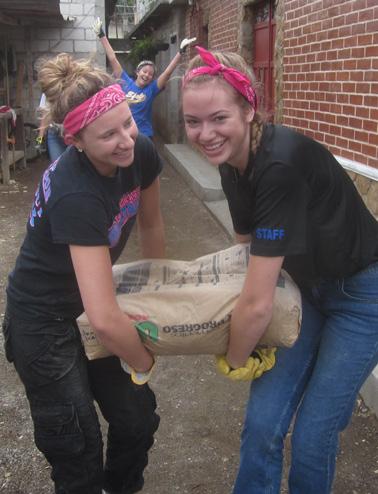

USE OF FUNDS »
Fundraising - 7%
Management - 11% Programs - 82%
3-year average
Common Hope is a 501(c)(3) not-for-profit corporation founded in 1986 and is audited annually.
Contributions are 100% tax deductible as allowed by law.
Common Hope would like to thank Martin LaVenture, Léna Seltzer, and Chelsea Petree for some of the photos you see featured in this book.